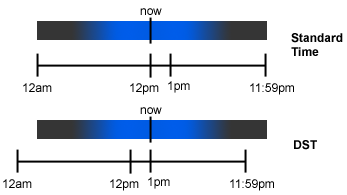Daylight Saving Time
Thursday, April 1, 2004 @ 1:16 amURL: http://webexhibits.org/daylightsaving/
An add on TV tonight reminded me that this weekend is the beginning of Daylight Saving Time. This prompted to me to some research, which prompted me to write this entry about what I found as well as some other thoughts I've had in the past on the concept of measuring time.
First, it is Daylight Saving Time not Daylight Savings Time as often mistaken. The website I found was quite thorough and did a good job explaining the history of daylight saving time, what its purpose is, and how it works.
The intended goal of shifting time backwards relative to the Earth's cycle is to move an hour of sunlight from the early morning before most people are awake, into the evening. That is the obvious part, but until now I never really understood why. Already, there is less daylight in the winter than the summer (if you don't live at the equator). Since the day is divided equally by noon, it shortens on both ends, so shorter days also means that the sun sets earlier. Being an evening, rather than morning person, daylight saving time always confused me because my intuition was to shift time in the opposite direction to move sunset forward in the winter (or backwards in the summer depending on what you call "standard") in order to compensate and narrow the disparity of sunset times between the winter and summer. I always felt that daylight saving time only exacerbated the problem. I failed to consider how early the sun would rise in the morning if you shifted time forward in summer.
I read that the goal of daylight saving time is to conserve energy. If the sun is out later, we use less electricity lighting our homes. I understand while more sun is a good thing. So then why do we have to change our clocks? Why not give us more daylight all year round, particularly in the winter when we need it most? The fact that in the winter it doesn't save energy (since we'd use it in the morning) isn't a reason not to do it (only not a reason to do it), but I guess it might bother some people having the sun rise as late as 8am. Personally, I find it both exciting and relaxing to start my day while it is still dark (though I rarely do, since I wake up late), but I realize that is probably just me.
Another reason cited not to have DST all year round is that the reason standard time is the standard is because midday is noon (plus or minus a few minutes), which brings me to my next point. As bizarre as I think daylight saving is, what really bugs me is a more fundamental problem with time that I refer to as "Today-Tomorrow Reasonable".
[ Keywords: Rants | Spring ]First, it is Daylight Saving Time not Daylight Savings Time as often mistaken. The website I found was quite thorough and did a good job explaining the history of daylight saving time, what its purpose is, and how it works.
| Why do I refer to shifting time backwards when DST causes us to set our clocks an hour forwards? |
|---|
It is a matter of your frame of reference, like when you are parked next to a truck that starts moving forwards and you feel like you are moving backwards. Both figures below represent a change to DST where midday at 12pm become 1pm. The first figure shows the normal view that if you think of time as invarient, you make the time of day that was 12pm go forward to 1pm. The second figure shows the view that I mean where if you think of time of day as unchanging (more accurate since middays are always the same length of time, 24hrs, apart even if it doesn't look that way on the clock due to DST) then the time scale has been pushed backwards.  |
I read that the goal of daylight saving time is to conserve energy. If the sun is out later, we use less electricity lighting our homes. I understand while more sun is a good thing. So then why do we have to change our clocks? Why not give us more daylight all year round, particularly in the winter when we need it most? The fact that in the winter it doesn't save energy (since we'd use it in the morning) isn't a reason not to do it (only not a reason to do it), but I guess it might bother some people having the sun rise as late as 8am. Personally, I find it both exciting and relaxing to start my day while it is still dark (though I rarely do, since I wake up late), but I realize that is probably just me.
Another reason cited not to have DST all year round is that the reason standard time is the standard is because midday is noon (plus or minus a few minutes), which brings me to my next point. As bizarre as I think daylight saving is, what really bugs me is a more fundamental problem with time that I refer to as "Today-Tomorrow Reasonable".
Comments
For some reason this one entry is receiving a lot of comment spam, so I'm turning off comments. Sorry.
Ben Buchwald — 12/08/2006 09:33 pm